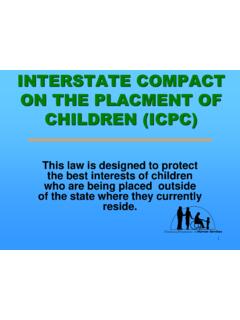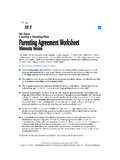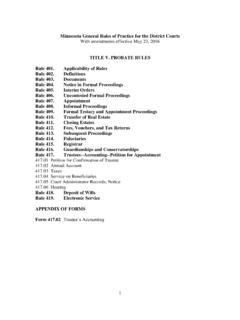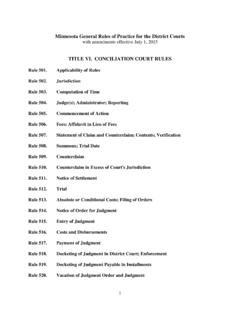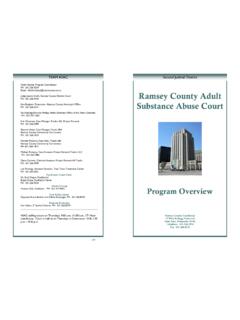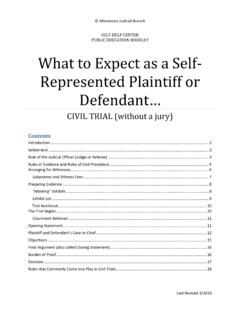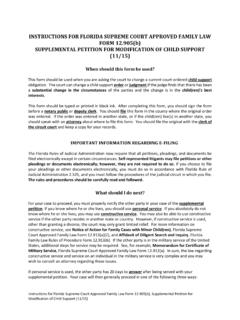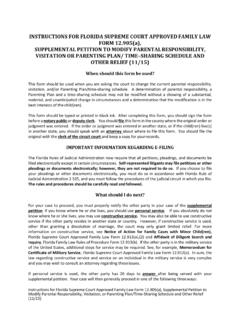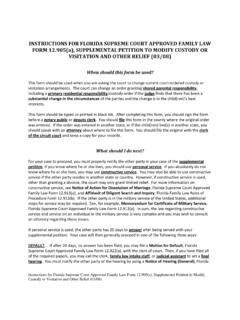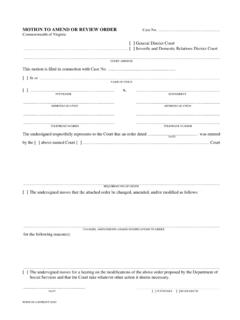Transcription of DIVORCE in Minnesota
1 DIV101 State ENG Rev 10/07 Page 1 of 3 Minnesota Judicial Branch Public Education Brochure From the Judges of Family Court What to DIVORCE in Minnesota Copyright permission granted by Manifesto Continere (Gerald B. Keane, esq.) with credit to the Sarasota County Bar Association and the Florida Twelfth Circuit Family Division Judges. Introduction A DIVORCE can be a painful and difficult experience, but if you understand the functions and limitations of the legal system, the process becomes less frustrating. It is our hope, as Judges of Family Court, that this pamphlet will give you a better understanding of the process, and help you get through your DIVORCE with realistic ideas and goals.
2 A DIVORCE action is called marriage dissolution or dissolution. Limitations Minnesota s DIVORCE system is based on the principle of no-fault, meaning that a dissolution will be granted if either party believes that the marriage is over. Generally the causes of the failure of the marriage are not an issue in court. All that matters is that the marriage needs to be ended. It is impossible for us to heal the emotional wounds created by your DIVORCE . You must understand that the legal system is not a tool for punishment of your spouse. The courtroom isn't the place for revenge. We must decide your case on the basis of unique facts.
3 In most cases, the law does not permit us to compensate either of you for the other s misconduct. Settlement The best way to conclude your case is to settle it. Through compromise and cooperation, a settlement can lead to greater mutual satisfaction and lessened animosity between you and your spouse. In most cases, negotiations toward settlement can be more productive and far less expensive than trial. If negotiations fail and you must try your case, we will make rulings that will permanently affect you and your children. Our rulings must be made exclusively upon the limited evidence that is presented in court, and nothing else.
4 Because we are restricted in what we can and cannot do, a settlement can offer a wider range of options. Ask the court administrator for information about mediation programs. A mediator is a neutral person trained to help you and your spouse reach a settlement. Variations Every dissolution is different. Your results may be very different from your neighbor s, friend s, or relative s. You cannot rely upon what happened in their cases and assume that your results will be the same. Cases that seem similar may, in fact, be very different and will be treated differently under the law. For this reason, you should look to your lawyer for your legal advice and information.
5 Your friends and relatives usually do not have a grasp of the law and your case, and accepting their advice may hinder you in the long run. Finances In the marriage dissolution, the income, assets and debts accumulated during the marriage must be allocated between you and your spouse. The law is that you and your spouse are financial partners during the marriage and are presumed entitled to share in both the assets and income the partnership made. You must make a full disclosure of your finances. For most people, life-styles change after a DIVORCE . Since divorces do not create property or income, we must divide the marital resources between two separate households. It costs more to run two households than one.
6 If you or your spouse have not been employed during the marriage, it may be DIV101 State ENG Rev 10/07 Page 2 of 3 necessary to seek employment. In considering a settlement, you should consider whether you can afford the attorney s fees to fully litigate your case. Fees and costs in contested cases can be quite high. Usually, a settlement prior to trial reduces the expenses considerably, an important consideration if you come to the DIVORCE with limited resources. Issues Dissolutions generally involve four major issues: child custody and parenting time, child support, spousal maintenance and a division of property and debts.
7 After the case is concluded, we may later be asked to modify custody, parenting time or support. You need to understand each of these aspects of your case. Child Custody Both parents and their children may be required to attend an education program before the dissolution is granted. The program will help you understand what affect DIVORCE has on children, and how you can make the transition less traumatic for them. Remember, your marriage may be ending, but you will always be parents to your children. Most parents will share parental responsibility for their children after the dissolution. In doing so, you must communicate and confer with each other in making decisions that will affect your children.
8 Usually, we will give one parent primary residential care (custody) of the children. Unless there is a good reason to limit parenting time, we will grant the other parent frequent parenting time. We decide custody solely on what is best for the children. Often, one of the parties is hurt by our decision, especially if that party sees the decision in a "win/lose" light. In truth, there can be no loser if the children s welfare is protected. In virtually all custody contests we will direct both parties to participate in mediation to resolve that issue. A mediator is an unbiased third party who can often assist the parties in reaching agreement upon what is best for the children.
9 An agreement on custody will certainly make your case easier and help your children immeasurably in dealing with your DIVORCE . If domestic violence has occurred, the Court cannot require you to participate in mediation. If an agreement regarding parenting time is not reached, a custody study may be ordered, with costs assessed to the parties. In cases where child abuse or neglect is alleged by a parent during a dissolution, we must appoint a guardian ad litem (GAL) to represent the best interests of the child with respect to custody, support and parenting time. A GAL may also be appointed if the court believes the conflict in the case presents a potential hazard to the child s welfare or the child s interests are not being adequately served.
10 The GAL is to conduct an independent investigation into what would be best for the child and to advocate for the child s best interests. GAL s must maintain confidentiality of information, monitor the child s best interest throughout the proceedings, and present written reports to the court on the child s best interests. If a GAL is appointed, you are likely to be assessed a fee for their services. Child Support Aside from continuing to love your children and seeing them often, you have no higher obligation as a parent than to continue supporting your children after the DIVORCE . Child support is more important than any other debt or financial obligation.

